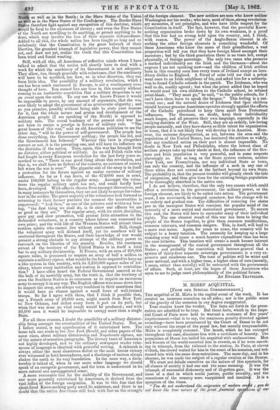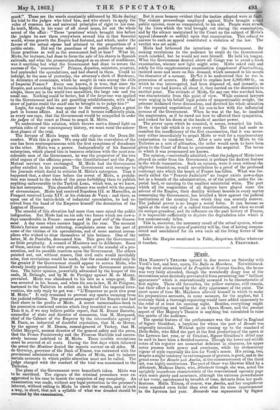M. MIRES' ACQUITTAL
[FROM OUR SPECLAL CORRESPONDENT.]
THE acquittal of M. Mires is the capital event of the week. It has created an immense sensation on all sides; nor is the public sense of the gravity of the occasion in any degree exaggerated.
Your readers know the verdict. The facts set forth in the prose- cation are admitted to be true. But these facts, which in the Impe- rial Court of Paris were held to warrant a sentence of five years" imprisonment—that is to say, the maximum penalty directed against swindling—have been pronounced by the Court of Douai to be not only without the scope of the penal law, but morally irreproachable. Mires is completely restored.. The bench, which he has outraged throughout the case, dismisses him with a certificate of honesty. The population of Douai has hailed his acquittal with acclamations. Men and *omen of the world escorted him in crowds, as if he were march- ing in triumph, from the tribunal to the station. In Paris, at eleven o'clock, the crowd waited for him in the court of his mansion, and wet- corned him with the same demonstrations. The same day, and in his absence, he was made the subject of a regular ovation at the Bourse. We must not delude ourselves on the nature of this spectacle, for all classes of society it had one and the same meaning. It was the triumph of successful dishonesty and of ill-gotten gain. It was the issue of a duel in which social justice, public morality, and the conscience of the country were vanquished and insulte4t It is a symptom of the times.
" You do not understand the exigencies of modern area not know the true nature of the great financial opc ; you do ions of OUT
epoch." These are the words constantly addressed by Mires daring his trial to the judges who tried him, and who strove to apply the rules of common law and universal principles of right to his case. In truth, Mires, in his want of all moral sense, let out the whole secret of the affair: "These practices' which brought him before the judges he saw them everywhere around him in that financial world, whose growth the Empire had fostered, and which, under the favour of the actual regime had attained to the proportions of a public estate. Did not the guardians of the public fortune adopt those practices as well as the commonest bull or bear ? What he, Mires, for instance, had done to force the sale of his shares in Spanish railroads, and what the prosecution charged as an abuse of confidence, was it anything but what the Government had done to secure the success of the 'conversion?' Princes, deputies, ministers, senators, had applauded the speculations, and had shared in them. Could he indulge, he the man of yesterday, the attorney's clerk of Bordeaux, in delicacies of conscience, which he sought in vain among the elite of Imperial France ? Every one knows, it is true, that since the Empire, and according to the formula happily discovered by one of its adepts, there are in the world two moralities, the large one and the small one. Nothing could be better, but if the large one was applied to the Government and its pet gambling establishments, with what show of justice could the small one be brought in to judge him ?" Logic, for aught that may appear to the contrary, plays a great part in human affairs. And at the end it became sufficiently plain, as every one says, that the Government would be compelled to order the judges of the court at Douai to acquit M. Mires. To understand this solution, which throws such a dismal light on certain sides of our contemporary history, we must recal the antece- dent phases of the triaL The fortune of Mires began with the regime of the Deux-De- cembre. With this it grew. We may add that the convulsion of the one has been contemporaneous with the first symptoms of decadence in the other. Mires was a power. Independently of his financial enterprises, which placed him in business relations with the most con- siderable men of the Government, he was the proprietor of the two chief organs of the officious press—the Constitutionnel and the Pays. Mutual services were exchanged. M. Mires had the Government policy extolled in his journals. The Government sent warnings to the journals which dared to criticize M. Mires's enterprise. Thus it happened that, a short time before the arrest of Mires, a prohibi- tion was issued to the whole of the press forbidding them to publish anything unfavourable to the Turkish Loan, whicewas, as we know, his last enterprise. This shameful alliance was sealed with the pomp of circumstance. Mires had received Napoleon III. at Marseilles, as Fouquet received Louis XIV. at his château de Vault: and there, as upon one of the battle-fields of industrial speculation, he had re- ceived from the hand of the Emperor himself the decoration of the Legion of Honour.
The scandal of this elevation had more than once raised the public indignation. But Mires had on his side two forces which are now-a- days considerable in France : success and the good will of the Govern- ment. A day came when success lagged in the rear. The moment Mires's fortune seemed tottering, complaints arose on the part of some of the victims of his speculations, and of some ancient accom- plices who wished to clear themselves of him betimes. One of the latter, M. de Pontalba, denounced him. This gave the Government no little perplexity. A council of Ministers met to deliberate. Some of them, anxious in their own persons, spoke of the scandal of a pro- secution, and its possible reaction upon the Government. The others pointed out, not without reason, that civil suits would inevitably arise, that revelations would be made, that the scandal would only be the greater if the Government should appear to screen Mires, who already loudly proclaimed himself to be under Government protec- tion. The latter opinion, powerfully advocated by the keeper of the seals, M. Delangle, and by M. de Persigny against M. de Moray, prevailed. Mires was abandoned to his fate as a scape-goat. He was arrested in his house, and when his son-in-law, M. de Polignac, hastened to the Tuileries to solicit on his behalf the imperial inter- vention, the only reply he got was : "L'Empereur ne pent rien pour M. Mires." It only remained to prevent any sparks escaping from the judicial collision. The greatest personages of the Empire had had their share in the profits of Mires. A secret memorandum-book in his possession contained entries which they trembled to see revealed. Thus it is, if we may believe public report, that M. Ernest Baroche, counsellor of state and director of commerce, that M. Mocquard, chief of the Cabinet of the Emperor by the intermediate agency of M. Panis, an industrial of doubtful reputation, that M. deMorny, by the agency of M. Donou, consul-general of Turkey, that M. Collet Meygret, ancient director of the general safety and the press, that the Prince Poniatowsky and the Princess Mathilde had succes- sively become indebted to M. Mires. These terrible revelations must be averted at all costs. During the first days which followed the arrest the Moniteur denied the reports current on all sides. M. de Germiny, governor of the Bank of France, was entrusted with the provisional administration of the affairs of Mires, and to balance certain accounts to which public attention must not be called. The edge charged with the conduct of the trial was summoned to the 'Tuileries.
The plans of the Government were henceforth taken. Mires was to be sacrificed. The rigours of the criminal procedure were ex- aggerated in his case to banish the suspicion of any complicity. An examination was made, without any legal protection to the prisoner's interest, without calling in Mires to check the results, and in'such a way, in short, that not a syllable of what was dreaded should be revealed by the examination. But it soon became evident that the tactics adopted were at fault. The violent proceedings employed against Mires brought r, unit public opinion, once so exasperated, to his side. People were struck by the vices which the trial brought oat during the examination, and by the silence maintained by the Court on the subject of Mires's appeal (demande en =We) upon that examination. This refusal to answer to such an appeal constituted a violation of the law. The verdict was set aside.
Mires had fathomed the intentions of the Government. By making revelations to the audience he could do the Government much mischief, but he would not save himself. He held his tongue.
What the Government desired above all things was to avoid a fresh examination, whence new light might arise. Mires asked only and solely for this supplementary examination (supplement d'instruction), insisted more and more on this demand, which assumed in his mouth the character of a menace. Helet it be understood that he was in possession of secrets. He offered to explain how 5,000,000 fr., on which he was interrogated, had been disposed of, and instantly, as if every one had known all about it, they carried on the discussion to another point. The attitude of Mires, for any one who watched him, was characteristic from this point of view. While eminent lawyers were urging in his behalf legal points of unquestionable weight, the prisoner disdained these discussions, and directed,his whole attention to the repeated negotiations of his son-in-law with the influential persons of the Government. When he was at the bar, he insulted the magistrates, as if he cared not how he affected their sympathies, and looked for his doom at the hands of another power. The power upon which he counted, it seems, rewarded his faith. Here is the tale which is in every mouth. The trial had made so manifest the insufficiency of the first examination, that it was neces- sary either immediately to acquit Mires or wait for a supplementary examination to condemn him. After a note sent by Mires to the Tuileries as a sort of ultimatum, the order would seem to have been given to the Court of Douai to pronounce the acquittal. The terms in which it was pronounced are known. The opinion,—universally admitted,—that thejudges of Mires have obeyed an order from the Government is perhaps the darkest feature in the whole transaction. Such an opinion, were it even without the slightest foundation, would nevertheless be a proof of the profound contempt into which the bench of France has fallen. What was for- merly called the " Pouvoir Judiciaire" no longer exists now-a-days but as a branch of the administration, or of the police, under the im- perial heel, or catering to the smallest ministerial whim. The part which all the magistrates of all degrees have played since the advent of the Empire, their docility without bounds in everymatter concerning the Government, has levelled a blow against the judicial institutions of the country from which they can scarcely recover. The judicial power is no longer a social force. It can become so again at the cost only of a radical transformation, and when we recal its antique grandeur, and its influence on the past history of France, it is impossible sufficiently to deplore the degradation into which it has spontaneously fallen. This is, moreover, the necessary result of the actual system, whose greatest crime in the eyes of posterity will be, that of having compro- mised and annihilated for its own ends all the living forces of the nation.
Like the Harpies mentioned in Fable, despotism defiles whatever































 Previous page
Previous page